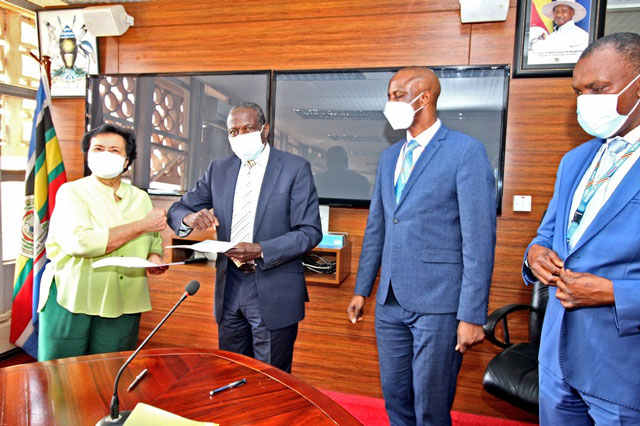
Kampala, Uganda | THE INDEPENDENT | Uganda Vinci Coffee Company Limited has denied being handed a monopoly over the coffee business in the country. This is part of the company’s defense in a suit filed by Henry Byansi and Michael Aboneka before the High Court Civil Division in Kampala.
In April 2022, the lawyers sued Uganda Vinci Coffee Company Limited and the Attorney General challenging the agreement signed by Ramathan Ggoobi, the secretary to the treasury on behalf of the government, and Enrica Pinetti, the board chairperson of Uganda Vinci Coffee Company Limited board on February 10, 2022, to process and export Uganda’s coffee on grounds that it is illegal and irrational.
The lawyers asked the High court to declare that the actions of the minister of Finance and Economic Development to handpick Vinci to solely manage the coffee business, and set coffee prices and related products in disregard of able Ugandan firms are an infringement on the right to own property and open competition as well as economic rights of coffee farmers in the country.
The agreement grants Vinci exclusive rights to buy Uganda’s coffee before the government can look at other players. The agreement also exempts the company from import duty tax, stamp duty, value-added tax, National Social Security Fund, and pay as you earn for ten years. The company also reserves the right to determine the coffee prices in the country on top of enjoying electricity subsidies and other benefits.
But in its defense, a copy of which Uganda Radio Network has seen, Vinci through its Company Secretary, Moses Matovu, says that the subject matter of the agreement is the establishment of a processing plant with a capacity to process up to 60,000 tonnes of green beans per annum.
“I aver that all the incentives in the agreement are neither intended to and in fact do not grant the 2nd respondent/Vinci a monopoly to manage the coffee business. This is because the project consists of the establishment of a coffee processing facility with a capacity to process an initial volume of 27,000 tonnes of green beans per annum and eventually a maximum capacity of 60,000 tonnes of green beans per annum,” said Matovu in his affidavit.
The evidence tabled before the court shows that Uganda exported 382,000 tonnes of coffee between May 2021 and April 2022 and that the International Coffee Organization indicates that Uganda has for the past two decades produced an average of 437,650 tonnes of coffee per year with 330,540 tonnes in the coffee year 2019-2020 alone.
This, Matovu, says makes it impossible for Vinci Company to obtain a monopoly over the management of the coffee business in Uganda when the maximum capacity of their project is 60,000 tonnes. “The 2nd respondent is not given powers to singly or otherwise manage the production or export of coffee as alleged. Nothing in the agreement forbids any person from producing or exporting coffee.”
He argues that the company is only empowered to set the price at which it buys coffee from willing sellers and not to regulate prices for other actors as alleged, arguing that the agreement also recognizes the regulatory mandate of Uganda Coffee Development Authority-UCDA in regulating coffee prices.
“I know that there is nothing in the agreement that gives the 2nd respondent/Vinci a monopoly or power over others to set prices since any prices paid by the 2nd respondent/Vinci pursuant to the agreement are subject to the usual forces of demand and supply and benchmarked on prices approved by the UCDA or the prevailing international market prices. The agreement guarantees higher revenues for the coffee growers”, says Matovu.
He adds that the agreement doesn’t violate any of the guiding principles under the national coffee policy of 2013 and the National Coffee Act 2021 as alleged by the petitioners. “The agreement has six objectives including value addition that shall be pursued at all levels for the benefit of all stakeholders, where the farmer will gain higher revenue from the premium price to be paid for specialty coffee and that every stakeholder will benefit from the increase in the quality of coffee and the resultant increase in revenue”, adds Matovu.
Matovu, who is also a lawyer by profession, says that the agreement was entered after obtaining the advice from the attorney general and accordingly it satisfied all the requisite legal and administrative processes. In April the sectoral committee on trade, tourism, and industry in parliament unanimously called for the cancellation of the agreement on grounds that it contravened the constitution and other tax laws.
Aboneka and Byansi have since submitted the decision of parliament to the court for review and cancellation of the coffee agreement. But Vinci Company argues that it is not the mandate of the legislative arm of the government to contract on its behalf and to that extent, the recommendations of the Parliamentary committee on tourism, trade, and industry dated April 29th, 2022 do not invalidate a contract lawfully entered by the executive arm of government.
Vinci says the applicants are not entitled to any of the remedies sought in the present application because it’s bad in law based on gravely misconceived facts arising from a misconstruction of the agreement or lack of understanding of the international coffee market. The Attorney General has already filed the government’s defense in this case pending a hearing on August 18, 2022, before Civil Division Judge, Emmanuel Baguma.
****
URN
 The Independent Uganda: You get the Truth we Pay the Price
The Independent Uganda: You get the Truth we Pay the Price



